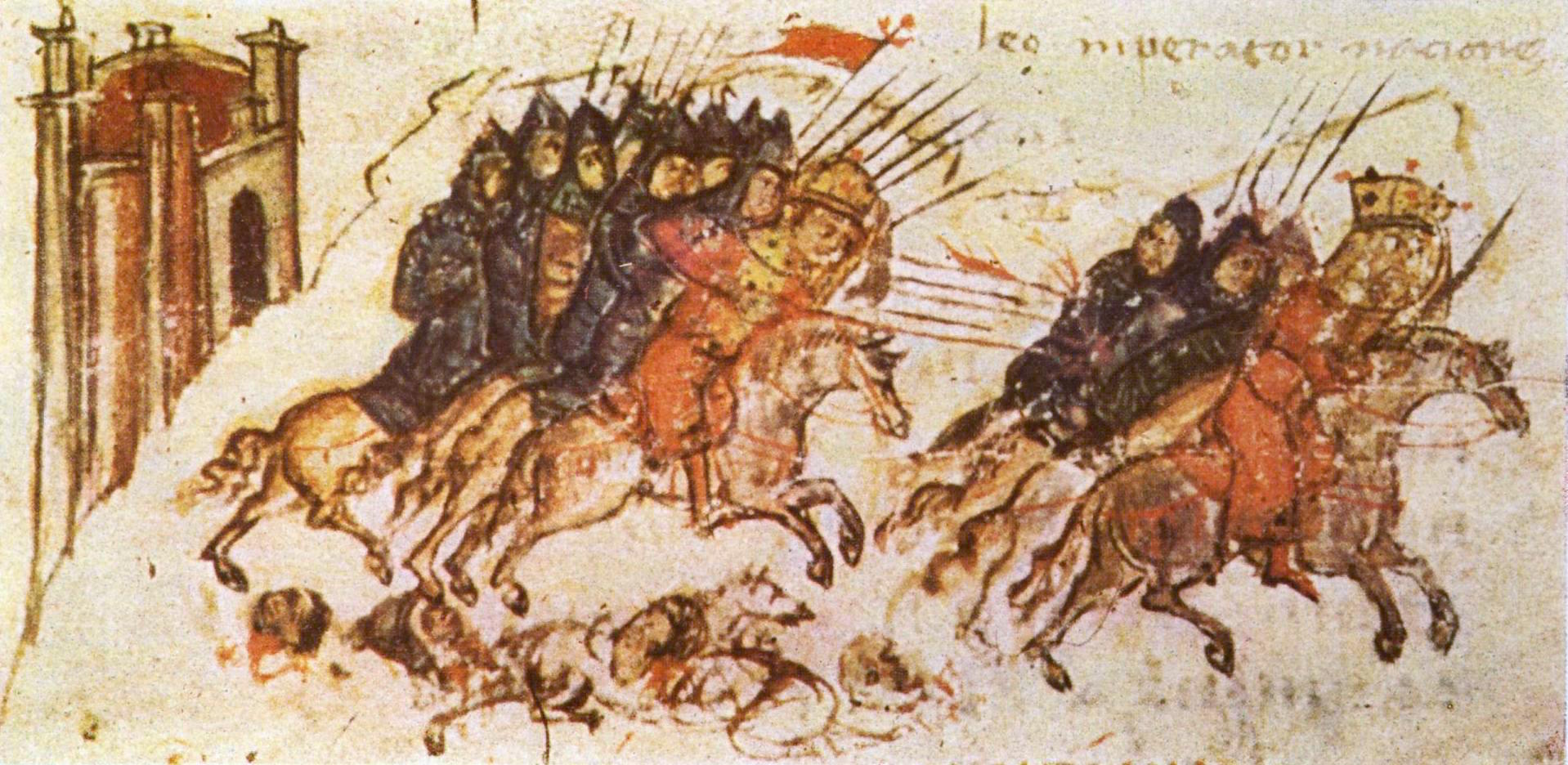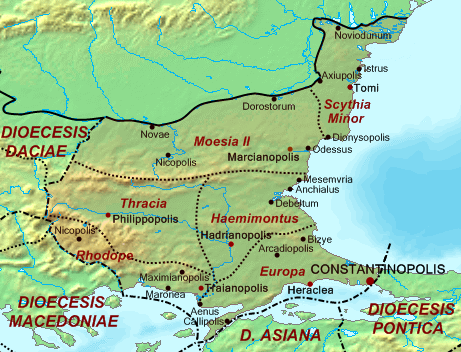|
Battle Of Berzitia
The Battle of Litosoria or Lithosoria ( bg, Битка при Литосория) occurred between the Byzantines and Bulgars in the fall of 774 at an unknown place named Litosoria. It was located in the border area between both states, in the region of Zagore, probably north of the line Kirklareli - Vize in modern Turkey. The result was a Byzantine victory. After an unsuccessful campaign of the Byzantine Emperor Constantine V earlier that year, the Bulgar Khan Telerig decided to strike back to the southwest and sent a small raiding army of 12,000 to capture Berzitia. The Byzantine emperor was informed of the raid in due time by his spies in Pliska and gathered an enormous force. The Byzantines surprised the Bulgarian army, and after a long fight they managed to defeat them due to their greater superiority in the number of soldiers. Constantine V was eager to follow up his success and led another campaign against the Bulgars, but once again it failed. However, Telerig learned d ... [...More Info...] [...Related Items...] OR: [Wikipedia] [Google] [Baidu] |
Bulgars
The Bulgars (also Bulghars, Bulgari, Bolgars, Bolghars, Bolgari, Proto-Bulgarians) were Turkic semi-nomadic warrior tribes that flourished in the Pontic–Caspian steppe and the Volga region during the 7th century. They became known as nomadic equestrians in the Volga-Ural region, but some researchers say that their ethnic roots can be traced to Central Asia. During their westward migration across the Eurasian steppe, the Bulgar tribes absorbed other tribal groups and cultural influences in a process of ethnogenesis, including Iranian, Finnic and Hunnic tribes. Modern genetic research on Central Asian Turkic people and ethnic groups related to the Bulgars points to an affiliation with Western Eurasian populations. The Bulgars spoke a Turkic language, i.e. Bulgar language of Oghuric branch. They preserved the military titles, organization and customs of Eurasian steppes, as well as pagan shamanism and belief in the sky deity Tangra. The Bulgars became semi-sedentary durin ... [...More Info...] [...Related Items...] OR: [Wikipedia] [Google] [Baidu] |
Battles Involving The First Bulgarian Empire
A battle is an occurrence of combat in warfare between opposing military units of any number or size. A war usually consists of multiple battles. In general, a battle is a military engagement that is well defined in duration, area, and force commitment. An engagement with only limited commitment between the forces and without decisive results is sometimes called a skirmish. The word "battle" can also be used infrequently to refer to an entire operational campaign, although this usage greatly diverges from its conventional or customary meaning. Generally, the word "battle" is used for such campaigns if referring to a protracted combat encounter in which either one or both of the combatants had the same methods, resources, and strategic objectives throughout the encounter. Some prominent examples of this would be the Battle of the Atlantic, Battle of Britain, and Battle of Stalingrad, all in World War II. Wars and military campaigns are guided by military strategy, wherea ... [...More Info...] [...Related Items...] OR: [Wikipedia] [Google] [Baidu] |
770s In The Byzantine Empire
77 may refer to: * 77 (number) * one of the years 77 BC, AD 77, 1977, 2077 Music * 77 (band) 77 is a Spanish/Catalan hard rock band from Barcelona, formed in 2006 by brothers Armand Valeta and LG Valeta. History The band's first lineup included Armand Valeta on vocals and rhythm guitar and LG Valeta on lead guitar, plus bassist Raw ..., a Spanish hard rock band * ''77'' (Matt Kennon album) * '' Talking Heads: 77'', debut album by Talking Heads * ''77'' (Nude Beach album), an album by the band Nude Beach See also * '77 (other) * 7/7, the 7 July 2005 London bombings * * List of highways numbered {{Numberdis ... [...More Info...] [...Related Items...] OR: [Wikipedia] [Google] [Baidu] |
8th Century In Bulgaria
8 (eight) is the natural number following 7 and preceding 9. In mathematics 8 is: * a composite number, its proper divisors being , , and . It is twice 4 or four times 2. * a power of two, being 2 (two cubed), and is the first number of the form , being an integer greater than 1. * the first number which is neither prime nor semiprime. * the base of the octal number system, which is mostly used with computers. In octal, one digit represents three bits. In modern computers, a byte is a grouping of eight bits, also called an octet. * a Fibonacci number, being plus . The next Fibonacci number is . 8 is the only positive Fibonacci number, aside from 1, that is a perfect cube. * the only nonzero perfect power that is one less than another perfect power, by Mihăilescu's Theorem. * the order of the smallest non-abelian group all of whose subgroups are normal. * the dimension of the octonions and is the highest possible dimension of a normed division algebra. * the first number ... [...More Info...] [...Related Items...] OR: [Wikipedia] [Google] [Baidu] |
770s Conflicts
77 may refer to: * 77 (number) * one of the years 77 BC, AD 77, 1977, 2077 Music * 77 (band) 77 is a Spanish/Catalan hard rock band from Barcelona, formed in 2006 by brothers Armand Valeta and LG Valeta. History The band's first lineup included Armand Valeta on vocals and rhythm guitar and LG Valeta on lead guitar, plus bassist Raw ..., a Spanish hard rock band * ''77'' (Matt Kennon album) * '' Talking Heads: 77'', debut album by Talking Heads * ''77'' (Nude Beach album), an album by the band Nude Beach See also * '77 (other) * 7/7, the 7 July 2005 London bombings * * List of highways numbered {{Numberdis ... [...More Info...] [...Related Items...] OR: [Wikipedia] [Google] [Baidu] |
Constantinople
la, Constantinopolis ota, قسطنطينيه , alternate_name = Byzantion (earlier Greek name), Nova Roma ("New Rome"), Miklagard/Miklagarth (Old Norse), Tsargrad ( Slavic), Qustantiniya (Arabic), Basileuousa ("Queen of Cities"), Megalopolis ("the Great City"), Πόλις ("the City"), Kostantiniyye or Konstantinopolis ( Turkish) , image = Byzantine Constantinople-en.png , alt = , caption = Map of Constantinople in the Byzantine period, corresponding to the modern-day Fatih district of Istanbul , map_type = Istanbul#Turkey Marmara#Turkey , map_alt = A map of Byzantine Istanbul. , map_size = 275 , map_caption = Constantinople was founded on the former site of the Greek colony of Byzantion, which today is known as Istanbul in Turkey. , coordinates = , location = Fatih, İstanbul, Turkey , region = Marmara Region , type = Imperial city , part_of = , length = , width ... [...More Info...] [...Related Items...] OR: [Wikipedia] [Google] [Baidu] |
Exile
Exile is primarily penal expulsion from one's native country, and secondarily expatriation or prolonged absence from one's homeland under either the compulsion of circumstance or the rigors of some high purpose. Usually persons and peoples suffer exile, but sometimes social entities like institutions (e.g. the papacy or a government) are forced from their homeland. In Roman law, ''exsilium'' denoted both voluntary exile and banishment as a capital punishment alternative to death. Deportation was forced exile, and entailed the lifelong loss of citizenship and property. Relegation was a milder form of deportation, which preserved the subject's citizenship and property. The term diaspora describes group exile, both voluntary and forced. "Government in exile" describes a government of a country that has relocated and argues its legitimacy from outside that country. Voluntary exile is often depicted as a form of protest by the person who claims it, to avoid persecution and prosecu ... [...More Info...] [...Related Items...] OR: [Wikipedia] [Google] [Baidu] |
Pliska
Pliska ( , cu, Пльсковъ, translit=Plĭskovŭ) was the first capital of the First Bulgarian Empire during the Middle Ages and is now a small town in Shumen Province, on the Ludogorie plateau of the Danubian Plain, 20 km northeast of the provincial capital, Shumen. Pliska was the first capital of Bulgaria, and according to legend founded by Asparuh of Bulgaria in the late 7th century; this legend is archaeologically unsubstantiated. The site was originally an encampment, with the first tent-shaped buildings at Pliska of uncertain date. No evidence exists of a settlement before the 9th century, and claims that the site dates from Late Antiquity have been contested. By the early 9th century, Pliska was surrounded by a defensive wall and of land was further enclosed by an outer earthwork with stone revetment long. After the Byzantine army sacked and burned Pliska in 811, led by the emperor Nikephoros I (), Pliska was rebuilt by Omurtag (), who used ''spolia'' from ... [...More Info...] [...Related Items...] OR: [Wikipedia] [Google] [Baidu] |
Berzitia
The Berziti (Bulgarian, Macedonian and sr, Берзити; el, Βερζῆτες) were a South Slavic tribe that settled in Byzantine Macedonia in the 7th century AD with the Slavic invasion of the Balkans. The Berziti settled in the vicinity of Lychnidos (Ohrid). One part of the same tribe settled in Brest, Belarus, while another, also known as Brsjaci ( Macedonian and sr, Брсјаци; bg, Бърсяци, ''Barsyatsi''), moved south into the Balkans. Etymology There are several theories as to the origin of the name "Brsjaci", according to the folk etymologies of the Mijaks recorded by Toma Smiljanić-Bradina the name comes from the Brsjak's great physical strength and endurance and propensity for violence and revolt with theories such as: "Brz i jak" meaning "fast and strong", and "Brziti" meaning "the fast ones" because of their supposed ability to run as fast as horses. Serbian writer Grigorije Božović also recorded similar findings which he ties to the Brsjaks abi ... [...More Info...] [...Related Items...] OR: [Wikipedia] [Google] [Baidu] |
Byzantine
The Byzantine Empire, also referred to as the Eastern Roman Empire or Byzantium, was the continuation of the Roman Empire primarily in its eastern provinces during Late Antiquity and the Middle Ages, when its capital city was Constantinople. It survived the fragmentation and fall of the Western Roman Empire in the 5th century AD and continued to exist for an additional thousand years until the fall of Constantinople to the Ottoman Empire in 1453. During most of its existence, the empire remained the most powerful economic, cultural, and military force in Europe. The terms "Byzantine Empire" and "Eastern Roman Empire" were coined after the end of the realm; its citizens continued to refer to their empire as the Roman Empire, and to themselves as Romans—a term which Greeks continued to use for themselves into Ottoman times. Although the Roman state continued and its traditions were maintained, modern historians prefer to differentiate the Byzantine Empire from Ancient Rome a ... [...More Info...] [...Related Items...] OR: [Wikipedia] [Google] [Baidu] |
Thracia
Thracia or Thrace ( ''Thrakē'') is the ancient name given to the southeastern Balkan region, the land inhabited by the Thracians. Thrace was ruled by the Odrysian kingdom during the Classical and Hellenistic eras, and briefly by the Greek Diadochi ruler Lysimachus, but became a client state of the late Roman Republic and early Roman Empire as the Sapaean kingdom. Roman emperor Claudius annexed the kingdom as a Roman province in 46 AD. Confines From the perspective of classical Greece, Thracia included the territory north of Thessaly, with no definite boundaries, sometimes to the inclusion of Macedonia and Scythia Minor. Later, Thracia proper was understood to include the territory bordered by the Danube on the north, by the Black Sea on the east, by Macedonia in the south and by Illyria to the west, roughly equivalent with the territory of the Thracian kingdom as it stood during the 5th to 1st centuries BC. With the annexation of the Thracian kingdom by the Roman ... [...More Info...] [...Related Items...] OR: [Wikipedia] [Google] [Baidu] |





